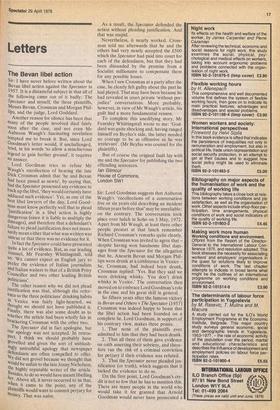The Bevan libel action
Sir: I have never before written about the Bevan libel action against the Spectator in 1957. It is a distasteful subject in that all of the following came out of it badly: The Spectator and myself, the three plaintiffs, Messrs Bevan, Crossman and Morgan Phillips, and the judge, Lord Goddard.
Another reason for silence has been that many of the people involved died fairly soon after the case, and not even Mr Auberon Waugh's fascinating revelation tempted me to break it. But, since Lord Goodman's letter would, if unchallenged, tend, in his words `to allow a mischievous legend to gain further ground', it requires an answer.
Lord Goodman tries to refute Mr Waugh's recollection of hearing the late Dick Crossman admit that 'he and Bevan had been pissed as newts', by saying that, had the Spectator possessed any evidence to back up the libel, 'they would certainly have adduced such evidence'. Yet, as one of the best libel lawyers of the day, Lord GoodTan must know perfectly well that to plead Justification' in a libel action is highly dangerous (since it is liable to multiply the damages), and therefore that a defendant's failure to plead justification does not necessarily mean either that what was written was untrue or that there was no evidence for it. In fact the Spectator could have presented quite a lot of evidence. But, as our leading counsel, Mr Fearnley Whittingstall, told us: 'We cannot expect an English jury to Prefer the evidence of Italian journalists and Italian waiters to that of a British Privy Councillor and two other leading British Politicians'.
The other reason why we did not plead Justification was that, although the reference to the three politicians' drinking habits la Venice was fairly light-hearted, we th.ought we should not have published it. Finally, there was also some doubt as to Whether the article had been wholly fair in bracketing Crossman with the other two.
The Spectator did in fact apologise, but our apology was not accepted. In retrospect, I think we should probably have ?jrovelled and given the sort of unblushingly untruthful apology that newspaper defendants are often compelled to offer. We did not grovel because we thought that would be unfair to the late Jenny Nicholson, the highly reputable writer of the article.
tlesides, to do so would have meant libelling izer. Above all, it never occurred to us that,
When it came to the point, any of the Plaintiffs would want to commit perjury for money. That was naïve.
As a result, the Spectator defended the action without pleading justification. And that was stupid.
Nevertheless, it nearly worked. Crossman told me afterwards that he and the others had very nearly accepted the £500 which the Spectator had paid into court for each of the defendants, but that they had been dissuaded by the promise from a Socialist millionaire to compensate them for any possible losses.
When I saw Crossman at a party after the case, he clearly felt guilty about the part he had played. That may have been because he had revealed in court private 'without prejudice' conversations. More probably, however, in view of Mr Waugh's article, his guilt had a more fundamental reason.
To complete this unedifying story, Mr Fearnley Whittingstall wrote to me: 'Goddard was quite shocking and, having ranged himself on Beyfus's side, the latter needed no courage to be as offensive as he was irrelevant'. (Mr Beyfus was counsel for the plaintiffs).
But of course the original fault lay with me and the Spectator for publishing the two offending sentences.
Ian Gilmour House of Commons, London SW1


































 Previous page
Previous page